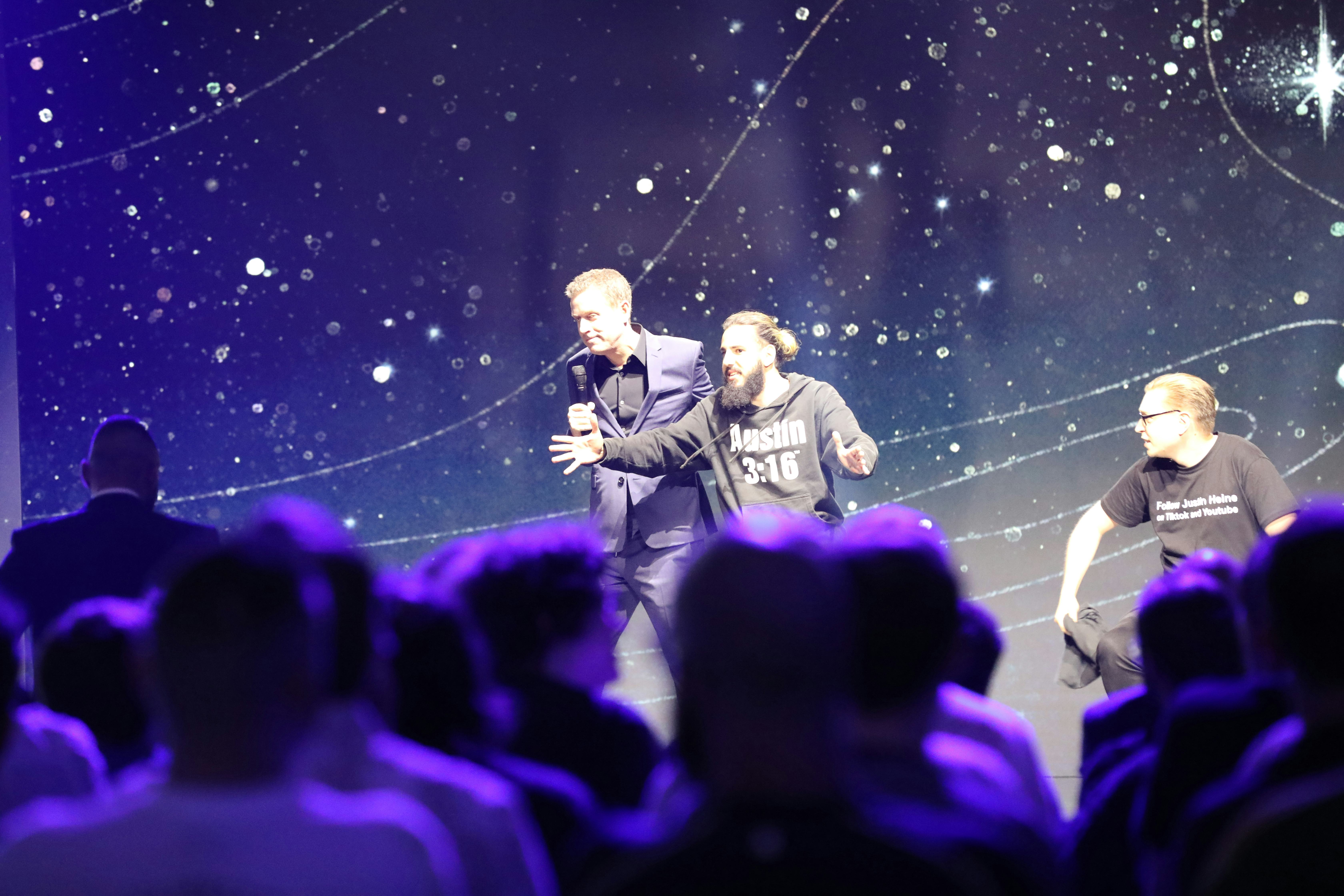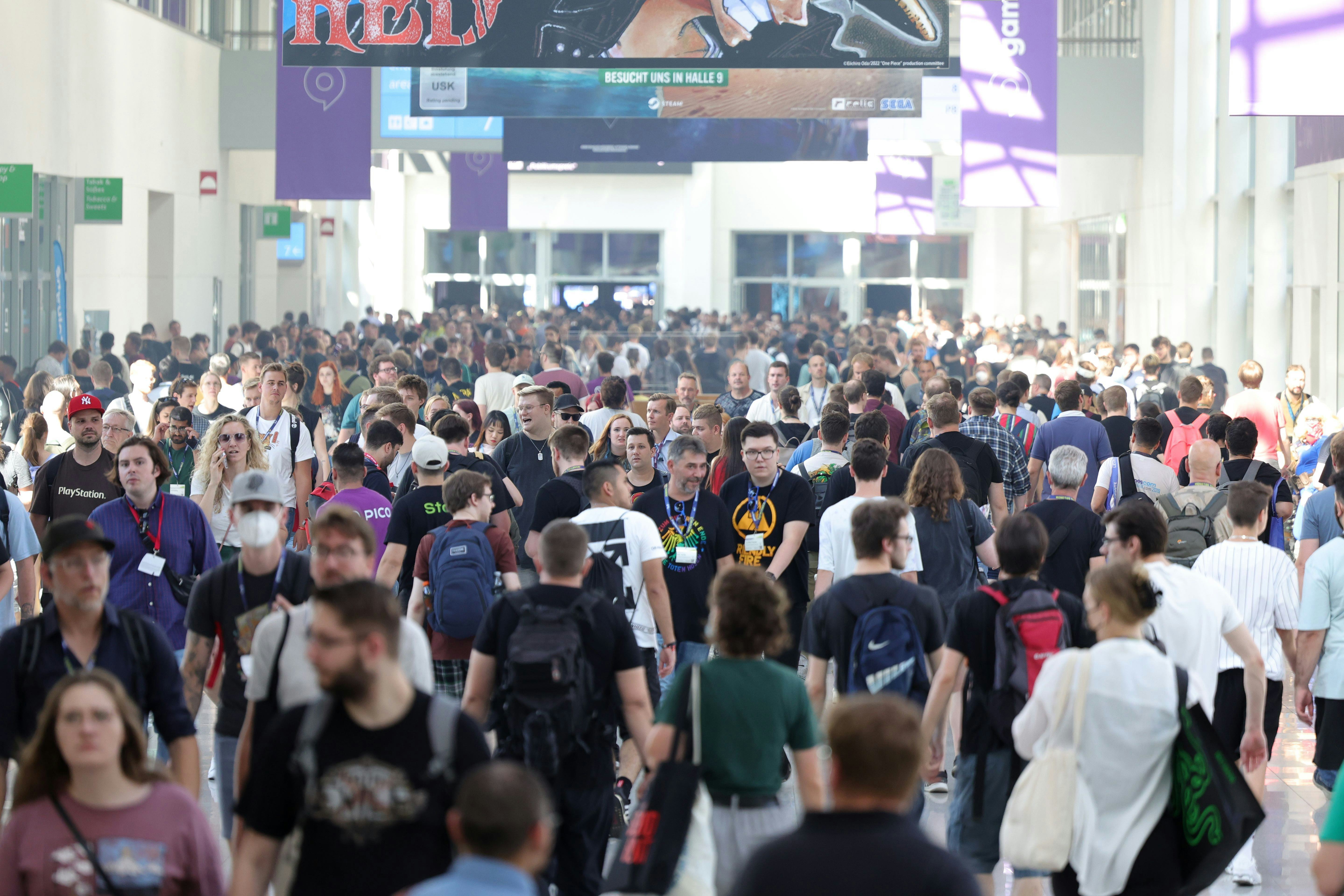
It’s December 2022. Geoff Keighley is interrupted on stage by someone shouting about Bill Clinton.
It’s August 2023. Geoff Keighley is interrupted on stage by someone shouting about Bill Clinton.
For the second time in under a year, an unknown, unvetted person has rushed the stage to take the spotlight at a Keighley-hosted event. Both times, the stage crasher was escorted off by security as confused viewers sorted out their thoughts on social media. And while in both cases, the overwhelming reaction was to laugh it off, the second incident brought out another angle — when are we going to start taking this seriously?
The first time it happened was at the 2022 Game Awards, where an audience member snuck onstage as Elden Ring’s developer accepted an award.
“I want to nominate this award to my reformed orthodox rabbi Bill Clinton,” the intruder said.
He was quickly revealed to be Matan Even, an internet troll who’d pulled similar stunts before. While there were initially some concerns that the comments were tied to far-right conspiracy theories about Jewish cabals running the world, a Polygon interview revealed Even to be nothing more than a deeply annoying teenager.
The second incident happened just minutes into Gamescom Opening Night Live 2023. Two men jumped on stage, and one (whose name has not yet been released) said “Bill Clinton wants to play GTA VI” before being rushed off by security.
Again, this wasn’t a first for the stage crasher. The same man reportedly interrupted Doppelpass, a German soccer commentary show, just two days earlier.
In an interview with VGC, head of Gamescom Christian Baur says “In the end it was good because the intention of the person was just something silly but, of course, if somebody with bad intentions would have tried to do the same thing, that was a big risk.”
While that thankfully remains a hypothetical, it’s one that’s too big to ignore. The Game Awards and Gamescom are two of the biggest events in the world of gaming. Thousands of people attend each event, which means the potential for someone with “bad intentions” to cause serious harm is something that deserves more than lip service.

And it’s not as if bad intentions are rare in gaming. As Gamergate both revealed and exacerbated, the scene is rotten with often violent bigotry. Tune in to the stream of any gaming convention or showcase, and you’ll see the chat erupt in slurs and threats the second anyone who isn’t a cishet white male appears on screen.
Or simply join the lobby of any popular online game and you’ll likely hear something similar before long. Developers and platform holders alike have been agonizingly slow to act on policing the communities in their games or on their consoles. Even in games that are well-known for having diverse player bases, like Overwatch, voice chat is full of abuse and slurs, with no real solution in sight.
If two anonymous trolls can make their way on stage at some of gaming’s biggest events, the people behind those comments can, too. The games industry needs to take steps to prevent the next stage crasher from shouting something far worse into the mic, or even attacking someone.
Unfortunately, safety is not an issue that in-person game industry events have a great track record with, and that goes far beyond Gamescom, The Game Awards, and this particular kind of nuisance.
The Game Awards 2022 was the first iteration of the show to have a live audience since the start of the Covid-19 pandemic. Despite the virus still circulating, The Game Awards elected not to require proof of vaccination, negative test results, or even masks for attendees. At least one developer, Mario + Rabbids Sparks of Hope composer Grant Kirkhope, says he contracted Covid-19 at the event as a result.
That’s even after a PAX East Enforcer (workers who help plan the event) named Dawn Wood died from a Covid-19 infection after working the convention, despite masks being required.
As a June 2023 report by Kotaku’s Alyssa Mercante makes clear, these conventions are also rife with harassment, threats, and sexual assault. Events from GDC to PAX are described as “hotbeds” of abuse, where women report being lured to supposed business meetings where they’re then assaulted or propositioned for sex. Industry parties that take place during major conventions are almost universally held in bars, and reports of spiked drinks and sexual harassment are rampant.
It’s clear from how widespread and varied the vulnerabilities at live events are that the games industry has ignored safety for too long. Grassroots organizations have sprung up to help stop sexual harassment and assault, but the onus needs to be on organizers and industry leaders to protect people from all kinds of threats. And while rooting out entrenched racism, misogyny, and homophobia in the games industry is a problem that will require long-term effort, keeping a few irritating dorks off convention stages before they give way to something much nastier seems like an easier task.







